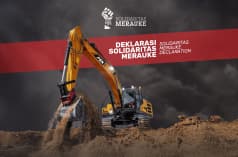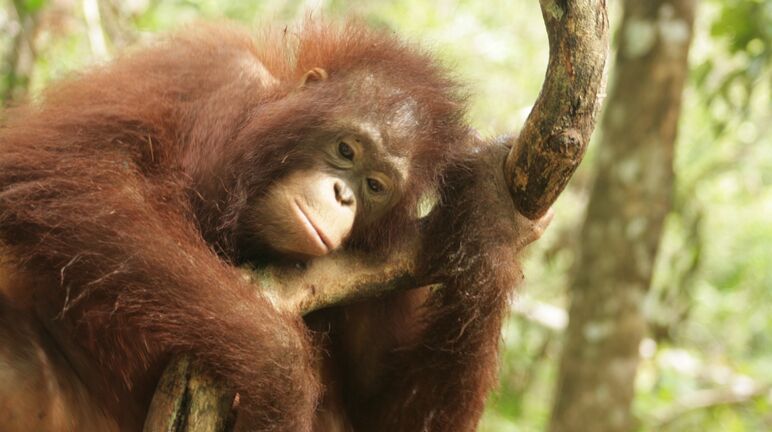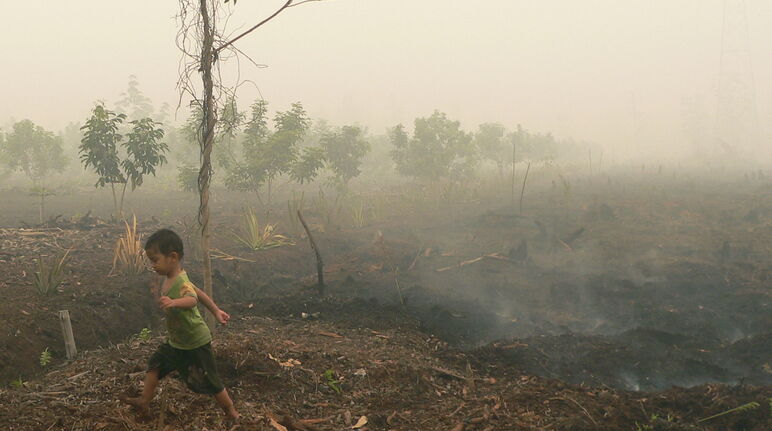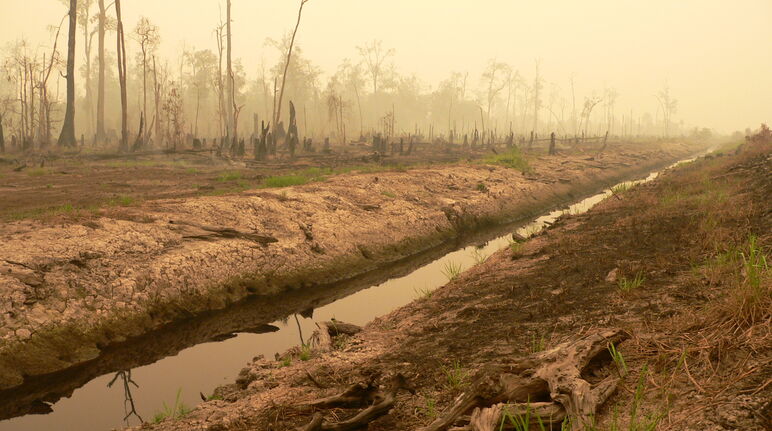NO to “Food Estates” in the peat forests of Borneo!
The Indonesian government is pursuing an insane project that could have consequences for everyone on this planet: The vast peat bog forests of Borneo could soon be destroyed for industrial rice farms. Nearly 200 Indonesian NGOs and conservationists are saying a loud and clear NO! to the plan. Please add your voice to their demands.
News and updates Call to actionTo: President Joko Widodo; Minister of Environment and Forestry, Siti Nurbaya Bakar; Governor of Central Kalimantan Province, Sugianto Sabran; District Chief of Pulang Pisau, Eddy Pratowo; Director of the Peat Authority, Nazir Foead
“Stop the Cetak Sawah project, an environmental and climate catastrophe in the making.”
It was an unmitigated disaster the first time around, and now the Indonesian government is looking to repeat the mistake – President Joko Widodo is planning 300,000 hectares of industrial rice plantations to ostensibly guarantee food security for the people. Cetak Sawah is the name of the plan in Indonesian – literally “paddy printing”. But this “Food Estate”, as the government euphemistically calls the project, is to be “printed” on peat bog forests which, once they have been cleared and drained, emit millions of tons of greenhouse gases into the atmosphere.
Indonesia’s peat bog forests are crucial to global climate protection. Peat stores 20 times as much carbon as mineral soils. The destruction of peat bogs accounts for 13 to 40 percent of global greenhouse gas emissions every year.
One of the proposed areas for the new project is the province of Central Kalimantan on the island of Borneo. In the 1990s, the government under the dictator Suharto cleared 1.4 million hectares of peat bog forests there. The goal back then was the same: to ensure food security through the large-scale industrial cultivation of rice. After the damage had been done, the project was abandoned when it was discovered that rice does not grow well on acidic peat soil.
Nearly 200 Indonesian NGOs are speaking out against the insane new plan: Hasn’t the government learned anything from its past mistakes? Where is the political will to finally take peatland restoration seriously? And why does the government see industrial agriculture as the answer, instead of promoting diverse rural land use by smallholders?
Please support the demands of the Indonesian NGOs with your voice – they need all the international backing they can get.
We reject the “Food Estate” in the peatlands of Central Kalimantan and elsewhere in Indonesia!
BackgroundEnvironmental crimes in Borneo’s peat bog forests
People on Borneo have been suffering extreme air pollution due to burning forests, plantations and peatlands in particular for decades. For more than twenty years, Indonesia has been one of the world’s worst climate offenders, mainly due to peat fires.
The major center of the fires is the former million-hectare PLG (Pengembangan Lahan Gambut: development of peat bogs) rice project from the 1990s. The project was a failure in every respect – ecologically, economically and socially. Most of the peat bog forests in the area were destroyed – and with them, precious habitat for orangutans, proboscis monkeys, black bears and clouded leopards. Local people were displaced, and yet no rice actually grows there – not even in wet cultivation – because the soil is too acidic. Numerous migrants who came from other islands have left the area, disillusioned. And worst of all, the drained former peat bogs are still burning – smoldering away underground.
For the most part, efforts to re-wet and reforest the area with its meter-thick peat layers and numerous peat domes have been unsuccessful. Blocking drainage channels so that water can once again soak through the layers of peat is a costly, herculean task. It also comes as no surprise that the operators of the numerous oil palm plantations and mines that have spread across the region in recent years have no interest in swamps and peat bogs.
Converting the degraded peatlands and remaining intact peat bog forests into rice plantations will only accelerate the climate catastrophe while doing nothing for food security – as experience has shown that rice will not thrive here.
Food security by growing rice on peatland?
In 2017, the government announced another plan to promote food security by establishing rice plantations on Borneo – once again on peat soils. While investors have expressed their interest in plantations operating with modern technology, the plan has not yet been implemented. One reason: the region is home to forest conservation and climate projects, because reducing the massive emissions from drained peat bogs would have a significant positive effect on the climate. Large-scale rice plantations would jeopardize the climate benefits of programs for the restoration of drained peatlands.
The government seems to be trying to take advantage of the COVID-19 pandemic to push the plan through under the radar, without public involvement. Indonesian civil society groups are sounding the alarm over the project, however. They warn that it will fail, and that instead of rice, all it will produce is serious social conflict and environmental damage.
NO to the Cetak Sawah Food Estate in the peatlands of Central Kalimantan!
Stop this disaster in the making!
In a statement by Indonesian civil society organizations, nearly 200 groups and environmental experts call for a genuine agricultural reform based on existing agricultural diversity and reject industrial plantations that impoverish many smallholders and indigenous peoples:
“For some weeks now, the Indonesian government has once again been singing its old song of ‘rice fields on peat soil’ and serving up empty promises of full rice bowls. While promoting industrial plantations on peatland, it is also sacrificing forests and fields for uses that have nothing to do with food security. Smallholders are being criminalized and conflicts over agricultural land are massively restricting people’s living space and self-sufficiency – and all this in the middle of a pandemic.
In the midst of the COVID-19 outbreak, the government is using food security as a pretext to advance a new rice project in the area of the defunct PLG, a million-hectare rice project in the 1990s that went went down in history as an unmitigated disaster. PLG destroyed peat bog forests, and the peatlands, which have never recovered, became a huge greenhouse gas emitter due to fires over the past two decades. Repeated efforts to restore the area have failed due to the government’s lack of political will. Instead of learning from the PLG experience, it now wants to forge ahead with around 300,000 hectares of rice plantations. The government has been propagating this as a strategic national project, without the slightest transparency, proper environmental impact studies or public involvement. The Ministry of Environment and Forests is currently trying to get around this by carrying out a ‘rapid strategic environmental assessment’ without consulting the people and disregarding civil rights and environmental issues.
We call on the government not to create a new disaster by repeating the mistakes of the past. It must stop using the pandemic as a cover for exploiting peatlands. We say a loud and clear NO to the project for the following reasons:
Firstly, the government is throwing good money after bad.
This project must be stopped in light of the bad experiences of the past. The PLG (million-hectare rice plantation on peat soils) project, which was launched by the president of the ‘New Order’, Suharto, in 1995 with Presidential Decree 82/95, and which was ended in 1998 during the administration of BJ Habibie with Presidential Decree 33/98, was a dismal failure. The reasons for the failure were a lack of understanding and the non-existence of socio-ecological studies of peat ecosystems. The project, which cost at least 1.6 trillion rupiah (USD 110 million) in public money, never even came close to turning the region into a rice-growing powerhouse. Instead, oil palms grow there today. Furthermore, the fact that the PLG project was financed with funds earmarked for forest restoration is downright perverse.
After the PLG project failed, there were at least two major political decisions to restore the peatlands. Firstly, Presidential Decree 80/1999, which awarded compensation to the affected population, and Decree 2/2007, which budgeted 3.9 trillion rupiah (USD 270 million) for the restoration of the peatlands. No stipulations were made about the use of the funds, however. Later, in the wake of the 2015 fires, the BRG peat authority took over the former PLG area. Its publicly funded restoration was given top priority, but the results have been negligible. The fact remains that virtually all large-scale rice plantations in Indonesia with public funding and private management are rife with corruption and fail time and again. The destroyed peatlands themselves have an even greater impact, with economic damage due to forest fires, firefighting costs and the impoverishment of local people.
Secondly, the project is environmentally destructive, and local people are suffering the consequences.
It’s time to stop the destruction of nature and stop sacrificing the health and livelihoods of local people. The failed economic system and the development model based on exploiting natural resources has serious consequences for life on our planet and the future of humanity. We currently face two serious problems – the climate crisis and the pandemic – because of the government’s failure to protect the public interest and curb the greed of corporations that continue to profit from the destruction of nature. Peatlands are unique ecosystems that are crucial for stabilizing the climate and protecting biodiversity in wetlands. This, in turn, can prevent the outbreak of zoonoses that arise from the destruction of nature.
The Indonesian government’s plan to establish rice plantations on peatland shows once again that it is not concerned with protecting the peat bog ecosystem. This project will have serious consequences – a fragile and catastrophic future that will have been deliberately created by the government itself. The former PLG project is already a disaster that has destroyed or threatens areas of rich biodiversity: Ramin (Gonystylus bancanus) or meranti rawa (Shorea balangeran) are tree species endemic to these peatlands. The natural habitat of orangutans has been lost, and the area is criss-crossed by many thousands of kilometers of canals and drainage ditches – the cause of the drying of the peatlands and the source of the fire and smoke disasters in Central Kalimantan, the impact of which can even be felt in neighboring countries. Forest fires have serious effects on public health, including respiratory problems and premature death, and are responsible for vast greenhouse gas emissions.
Since the terrible fires in 1997 that burned 80 percent of the countryside and releasing 150 million tons of carbon, the area has been plagued by fires every year. From 2015 to 2019, most of the hotspots were located there, affecting 465,003 hectares – 39 percent of the total burned area of Central Kalimantan – with some areas burning repeatedly.
The failure of the government to protect its citizens’ right to a healthy environment was confirmed by the Supreme Court in its ruling 3555/K/Pdt/ 2018 of July 16, 2019 in response to a citizen lawsuit. The plaintiffs had called on the government put legal measures in place to deal with the fires and put peatland under protection. The planning of rice plantations on peat soils again shows the ignorance of the government, which wants to exploit peatlands instead of protecting and restoring them.
Thirdly, the government should put the production of food in the hands of farmers and grant them the right to land.
After the failure of the PLG project, it should have been up to the government to restore the area. The population as a whole must be compensated, as some have already received damages. In reality, however, inequalities in land use are on the increase and land conflicts have repeatedly erupted. The reason lies in the policy by which permits for oil palm plantations are issued in a large part of the PLG area. Issuing permits for forests or protected peatlands violates land use regulations and other laws. These violations are done with impunity, leading to conflicts and the theft of indigenous land. Traditional agriculture and fishing techniques, which are sustainable by nature, are lost, as is the common land cultivation practice of the indigenous peoples. The settlement of migrants from other Indonesian islands has changed the social structure and traditional forms of land ownership in some areas. When state systems of land titles and traditional ideas about land use collide, conflicts are inevitable.
On the basis of the above considerations, we – a coalition of civil society organizations in the fields of environmental protection and indigenous rights – clearly and unequivocally state:
We reject rice plantations in the peatlands of Central Kalimantan and elsewhere in Indonesia!
In the times of pandemic, the government should protect natural resources first to curb the spread of COVID-19. In addition to dealing with the immediate threat of disease, the government must also take action to prevent uncontrolled climate change in order to limit the global temperature increase to 1.5°C or less. It must radically change the agricultural system and large-scale land use. We need a real agricultural reform based on food self-sufficiency and local knowledge. This is the only way to improve public health and ensure the sustainable use of natural resources in the long term. Nowadays, the government should promote food diversity and local varieties in the different parts of Indonesia. In order to optimize food production, it should promote farming on suitable land or on former plantations and degraded mineral soils and put simple technology at the farmers’ disposal. It should, however, reject industrial agriculture, costly technologies and agriculture on peat soils.
We also urge the government to stop clearing agricultural land for infrastructure, mining and oil palm plantations. Such policies do not serve the interests of the people. It is time to put farming and food production back in the hands of smallholders, the pillars of Indonesia as a country of agriculture.”
For justice and the environment!
Coalition of civil society organizations and individuals:
- 1 Eksekutif Nasional Wahana Lingkungan Hidup Indonesia (WALHI)
- 2 Greenpeace Indonesia
- 3 Auriga
- 4 ELSAM
- 5 Pusaka
- 6 Save Our Borneo
- 7 JPIC Kalimantan
- 8 LBH Palangkaraya
- 9 Solidaritas Perempuan Mamut Menteng Kalteng
- 10 Progress
- 11 Jikalahari
- 12 Yayasan Betang Borneo (YBB)
- 13 Yayasan Anak Dusun Papua (YADUPA)
- 14 Lembaga Studi dan Advokasi HAM (ELSHAM) Papua
- 15 Pantau Gambut
- 16 Andi Wijaya - LBH Pekanbaru
- 17 AMAN Kalteng
- 18 PP MAN
- 19 PB AMAN
- 20 MADANI
- 21 Perkumpulan Hijau - Jambi
- 22 Kaoem Telapak
- 23 PILNET Indonesia
- 24 WALHI Kalteng
- 25 Asep Y. Firdaus
- 26 Gemma Ade Abimanyu - DD WALHI Kalteng
- 27 Kissworo DC – WALHI Kalsel
- 28 Yohana Tiko – WALHI Kaltim
- 29 Nicodemus Ale – WALHI Kalbar
- 30 Rere Christanto - WALHI Jatim
- 31 Ismail Alhabib - WALHI Jateng
- 32 Jessix Amundian - WALHI Babel
- 33 Halik Sandera - WALHI Yogyakarta
- 34 Riko Kurniawan - WALHI Riau
- 35 Tubagus Soleh Ahmadi - WALHI DKI Jakarta
- 36 Murdani - WALHI NTB 37 Abdul Haris - WALHI Sulteng
- 38 Aiesh Rumbekwan - WALHI Papua
- 39 Hairul Sobri - WALHI Sumsel
- 40 Irfan Tri Mursi - WALHI Lampung
- 41 I Made Juli Untung Pratama - WALHI Bali
- 42 Uslaini - WALHI Sumbar
- 43 Saharuddin - WALHI Sulawesi Tenggara
- 44 Umbu Wulang - WALHI NTT
- 45 Ahmad Rusydi Rasjid - WALHI Maluku Utara
- 46 M. Nur - WALHI Aceh
- 47 Muhammad Al Amin - WALHI Sulsel
- 48 Rudiansyah - WALHI Jambi
- 49 Meiki W Paendong – WALHI Jawa Barat
- 50 Romes Ip - KALIPTRA Andalas
- 51 Yohanes Akwan - Perkumpulan Bin Madag Hom Teluk Bintuni - Tanah Papua
- 52 Sarah Agustio - Tim Kerja Perempuan dan Tambang
- 53 Angga Septia - Perkumpulan Alami
- 54 Susan Burdam (Individu)
- 55 Khairuddin Zacky (PBH Kalimantan)
- 56 EcoNusa
- 57 Papua Itu Kita
- 58 Perkumpulan Panah Papua
- 59 Dewan Masyarakat Adat Momuna (DMAM) Papua
- 60 LinkAr - Borneo
- 61 Marko Mahin (Forma HOB/LSD-21)
- 62 Yayasan Tanah Merdeka
- 63 ICEL
- 64 Konsorsium Pembaruan Agraria
- 65 Elpagar
- 66 HUMA
- 67 Siti Maimunah, JATAM
- 68 Forest Watch Indonesia
- 70 JKPP
- 71 RMI
- 72 IHCS
- 73 Perkumpulan Bahtera Alam
- 74 Agus Sutomo, Kalimantan Barat
- 75 NTFP- EP Indonesia
- 76 Tjatur Kukuh S - Santiri Foundation
- 77 Mukti Ali, Kawal Borneo
- 78 FOKER LSM Papua
- 79 Fian Indonesia
- 80 HaKI
- 81 debtWATCH Indonesia
- 82 Genesis Bengkulu
- 83 PPLH Mangkubumi - Jawa Timur
- 84 JPIK
- 85 Roedy Haryo Widjono AMZ, Nomaden Institute CrossCultural Studies
- 86 Rahman Dako, Japesda Gorontalo
- 87 Solidaritas Perempuan
- 88 KIARA
- 89 Barid Hardiyanto
- 90 Kartini Samon, GRAIN
- 91 Ahmad sja, Padi Indonesia
- 92 Etnika Semesta Katulistiwa kaltara
- 93 LBH Papua
- 94 Papuan Voices Nasional
- 95 Perkumpulan Terbatas Pengkajian dan Pemberdayaan Masyarakat Adat(pt.PPMA) Papua
- 96 AMAN Sorong Raya
- 97 Adi Syaputra Kelopak Bengkulu
- 98 Papua Forest Watch (PFW)
- 99 Sulteng Bergerak
- 100 Jufriansyah, STABIL (Sentra Program Pemberdayaan dan Kemitraan Lingkungan), Kaltim
- 101 YALI Papua
- 102 Yayasan YAPHI Surakarta
- 103 Peruati Kalimantan Tengah
- 104 Pasah Kahanjak
- 105 Jaringan Perempuan Borneo
- 106 Peruati Kalimantan Selatan
- 107 Sumiati Suryani-Aliansi Perempuan Kalimantan
- 108 Komunitas Dayak Voices
- 109 Taibah Istiqamah
- 110 Ode Rakhman
- 111 Wahana Tani Mandiri
- 112 RETINA Institute
- 113 Paulus A. Y. D.
- 114 Anton P. Wijaya
- 115 April Perlindungan, Buruh Harian Lepas
- 116 Fajri NS
- 117 Puan Mahakam - Kalimantan Timur
- 118 Komunitas Pelangi Kalimantan Selatan
- 119 SKPKC Fransiska Papua
- 120 Louise Theresia
- 121 SKP Kame - Merauke
- 122 Gemapala Fak- Fak
- 123 Trend Asia
- 124 Kalbis Care Share
- 125 BEM FMIPA UI
- 126 BEM FH UI
- 127 Jaga Rimba
- 128 Novita Indri
- 129 KPA ARKADIA UIN JKT
- 130 KMPLHK RANITA UIN SYARIF HIDAYATULLAH JAKARTA
- 131 MAGIPALA
- 132 Ian Arya Danarko
- 133 Brian Chafariz Nursidiq
- 134 PKD MAPALA JABODETABEKA
- 135 Benua Hijau Indonesia
- 136 KMPA EKA CITRA UNJ
- 137 Komunitas Island Not For Sale
- 138 KMPA Manunggal Bhawana Institut Teknologi Indonesia
- 139 MAPADIKA USNI
- 140 PKW MAPALA Tangerang Selatan
- 141 KMPLH Farmasi UHAMKA
- 142 Rustandi Adriansyah, Lembaga Advokasi Rakyat, Palembang
- 143 Juliade - LPMA
- 144 Gusti Nordin Iman, Yayasan Sumpit (Kalsel)
- 145 Rudy Redhani
- 146 Institute for National and Democracy Studies (INDIES)
- 147 Pembaru Indonesia
- 148 Front Mahasiswa Nasional
- 149 TuK Indonesia
- 150 LEMBAH
- 151 LBBT Pontianak
- 152 Institut Menua Punjung (IMP)
- 153 Norman Jiwan
- and many others
To: President Joko Widodo; Minister of Environment and Forestry, Siti Nurbaya Bakar; Governor of Central Kalimantan Province, Sugianto Sabran; District Chief of Pulang Pisau, Eddy Pratowo; Director of the Peat Authority, Nazir Foead
Dear Mr. President, Ladies and Gentlemen,
A coalition of Indonesian environmental organizations and conservationists has been speaking out against your government’s potentially devastating plan to establish 300,000 hectares of industrial rice plantations on peatland.
From experience with the PLG project and the difficulties in restoring cleared and drained peat soils, the coalition concludes that the new plan will be very costly, but will most likely not work. The Cetak Sawah project is environmentally destructive because it is based on the exploitation of natural resources. This kind of economic policy endangers the survival of humanity.
In times of the coronavirus crisis and the looming climate catastrophe, Indonesia must put effective protection of its peatlands in place. Peatlands are unique ecosystems that are crucial for stabilizing the climate and protecting biodiversity in wetlands. This, in turn, can curb the outbreak of zoonoses that arise from the destruction of nature. Indonesia should show serious political will to limit climate change. This will only be possible if you protect the peatlands!
Every year, residents of Borneo and other Indonesian islands, as well as those of neighboring countries, have to endure the smoke and haze of forest fires that lead to respiratory conditions and shortened lifespans. The state, however, has a responsibility to protect the health of its citizens!
The destruction of forests can also lead to new viruses making the leap to humans. Therefore, it is incomprehensible that you are taking steps that go in precisely the wrong direction of what would be required in times of pandemic: the restoration of peatlands and the protection of the last rainforests are crucial at this juncture.
In a public statement, the coalition has warned that economic policy must not be based on the exploitation of natural resources. Instead, Indonesia should promote diverse local agriculture.
I agree with the demands of the Indonesian groups and environmentalists, particularly because Indonesia has a leading role to play in tackling climate change and pandemics that have their origins in the destruction of rainforests and thus of wildlife habitats.
Yours faithfully,
Indonesia: The Tongka rainforest is safe!
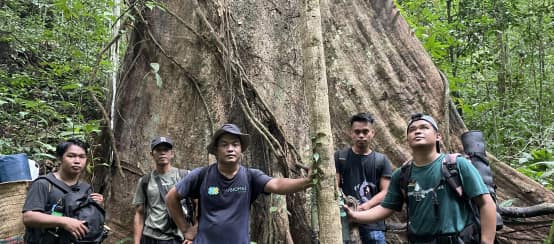
The village of Tongka on the Barito River in Borneo now has an official title to nearly 6,000 hectares of ancestral forest, ensuring that the Indigenous community can legally stand its ground against the loggers, mining companies and palm oil plantations eating away at Borneo’s rainforest. This success was achieved with the help of Rainforest Rescue and our partner organization, Save Our Borneo.
Indonesia: Protesters killed and injured on oil palm plantation in Bangkal, Borneo
On October 7, Indonesian police guarding oil palm plantations in Borneo opened fire on protesting Indigenous people. The aftermath: one dead, two seriously injured and twenty arrests. The scene of the crime is a plantation of the Best Group near the village of Bangkal.
A man-made disaster: Mega-plantations in the rainforests of Sumatra
Indonesian mega-plantations are consuming millions of hectares of forest and destroying the livelihoods of smallholders. A brief look at the reality of the "Food Estates" of North Sumatra.
A victory for land rights: Penyang village prevails in court
An encouraging precedent: Mr. Hiden from the small village of Penyang in Borneo has won a lawsuit against a powerful palm oil company. According to the court ruling, the company must return the land stolen from the village.
Study: Indonesia's “Food Estates” drive hunger and environmental destruction
A new study reveals Indonesia’s plans to clear hundreds of thousands of hectares, including pristine forests, for “food estates”. Similar projects in the past were thinly veiled land grabs that offered massive profits to the timber and palm oil industries while doing little or nothing to improve food security.
This petition is also available in the following languages:
Help us reach 200,000:

